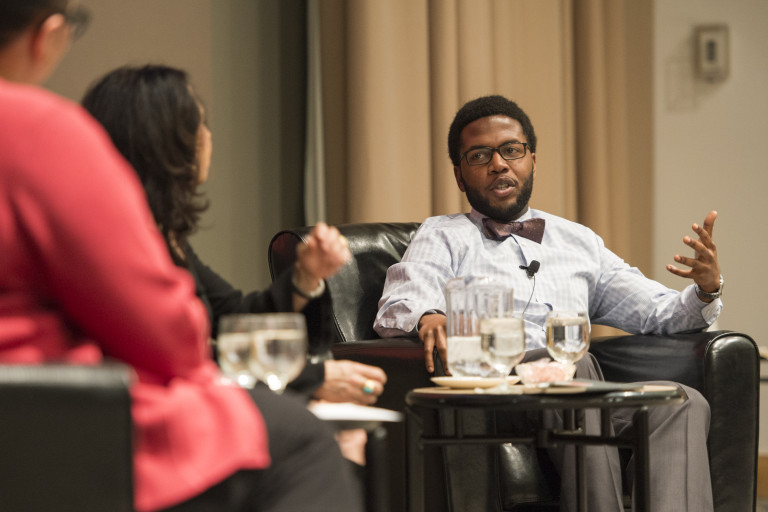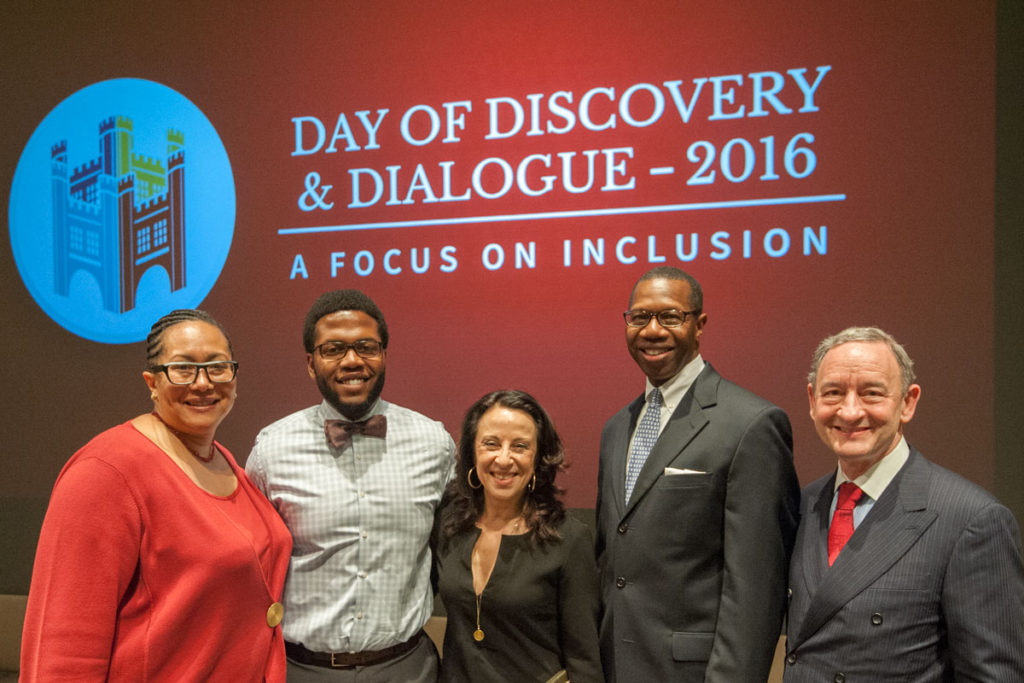Diverse background inspired soon-to-be physician to focus on cultural competency in health care

Lawrence Benjamin, participating in a panel discussion, offers his perspective on diversity and inclusion during the Day of Discovery & Dialogue at Washington University in February. Benjamin will earn his medical degree in May from the School of Medicine.
Ask Lawrence Benjamin where he is from, and there isn’t just one answer.
“I am from Durham, Dallas and Salt Lake City, and I have close ties to Boston and St. Louis,” said Benjamin, who will earn his medical degree in May from Washington University School of Medicine.
Growing up in a medical family – his father is a cardiologist, his mother a registered nurse – he moved frequently. “I’m from all over,” said Benjamin, 26, a noted leader in his class, particularly in issues pertaining to cultural diversity. “I like to adapt.”
Benjamin’s experience living across the United States, coupled with his roots as a first-generation American – his father is Guyanese, his mother Haitian – spurred his interest in exploring how a person’s background can affect individual health care.
After he earned a bachelor’s degree in neurobiology from Harvard University, Benjamin spent about six months volunteering in Fond-des-blancs, a poor, remote village in southern Haiti a year or so after it was devastated by a major earthquake. “I saw people living in tents, rubble everywhere, raw sewage out in the open, dirty water,” he recalled. “I learned valuable lessons about the practical realities and complex situations often involved in medicine.”
By the time he started medical school at Washington University in 2012, Benjamin was focused on “cultural competency” in health care. “We all have different life experiences, for better or for worse, and those circumstances often come into play when treating a patient,” Benjamin said.
“For example, it can be easy to assume patients not taking their medication are uninterested in improving their health,” he said. “But other things might be going on that we’re not aware of because they are not a part of our life experiences. A person may not have transportation to get the medicine. A person may not have the time to get a prescription due to working multiple jobs. A person may not have the money or insurance. There are many possibilities to take into consideration when devising a treatment plan. Physicians need to get a thorough history and not take any shortcuts.”
During his four years at the School of Medicine, Benjamin has been involved in the campus chapter of the Student National Medical Association, which serves minority medical and premedical students. As co-president during his second year, he helped to organize a regional conference on health disparities.
Additionally, Benjamin served as a student representative on the Faculty Diversity Committee, the Sexual Assault and Relationship Violence Task Force and the Washington University Medical Plunge program, which requires incoming medical students to spend a week learning about public health issues affecting the St. Louis area.
Most recently, in February, Benjamin participated in the campus-wide Day of Discovery & Dialogue, in which he discussed diversity, inclusion and other issues on a panel with Maria Hinojosa, an award-winning NPR and PBS journalist.
Benjamin plans to pursue diversity issues as an internal medicine resident at the Harvard-affiliated Massachusetts General Hospital in Boston. “I’m not sure if I’ll become a general practitioner or specialize in pulmonary and critical care or cardiology, but regardless, I plan to continue to explore nuances affecting health care, particularly in those who are underserved,” he said.
“For me, medicine is personal.”
by Kristina Sauerwein

Lawrence Benjamin was among those who led discussions on diversity and inclusion during Washington University’s Day of Discovery & Dialogue in February. From the left: Vice Provost Adrienne Davis; Benjamin; Maria Hinojosa, award-winning NPR and PBS journalist; Will Ross, MD, associate dean for diversity; and Chancellor Mark S. Wrighton.